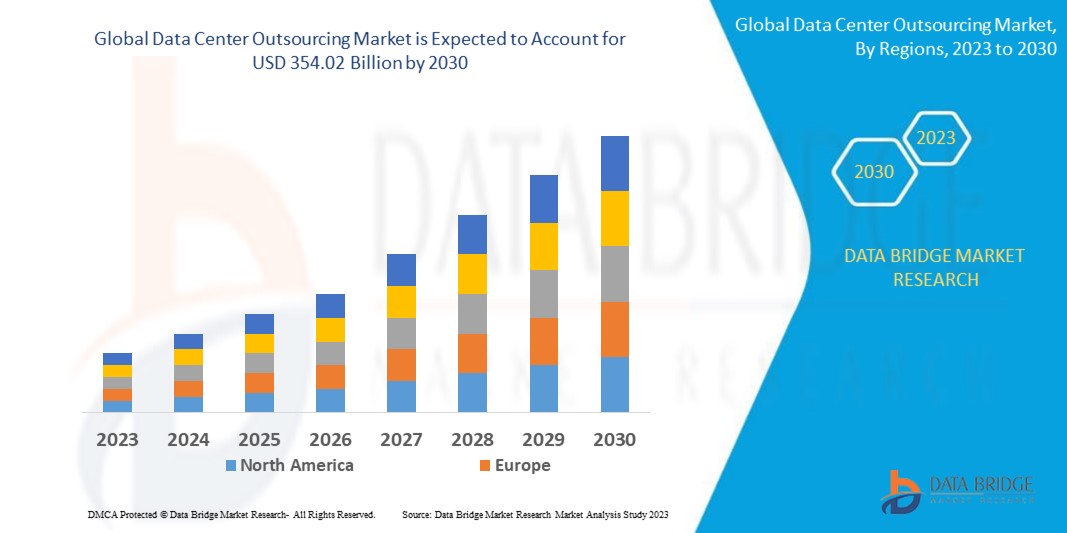Data Center Outsourcing Market Research Report | Growth, Trends and Advancements | 2025 - 2032
Data Bridge Market Research analyses that the global data center outsourcing market, which was USD 240.99 Billion in 2022, would rocket up to USD 354.02 Billion by 2030 and is expected to undergo a CAGR of 5.05% during the forecast period.
Introduction
The Data Center Outsourcing Market has become one of the most transformative areas within the IT services industry as businesses continue to migrate away from traditional in-house infrastructure management. With the increasing complexities of digital transformation, cloud adoption, and growing data volumes, organizations are recognizing the advantages of outsourcing their data center operations to specialized providers. Data center outsourcing allows enterprises to optimize costs, improve efficiency, ensure compliance, and focus on their core business functions while relying on experts to manage critical IT infrastructure.
This market has grown steadily as enterprises of all sizes seek scalable, secure, and agile solutions to handle rapidly evolving demands. From financial institutions and healthcare organizations to retail chains and government agencies, data center outsourcing has become an essential strategy for organizations worldwide. This article examines the dynamics of the data center outsourcing market, including key drivers, challenges, regional insights, technological innovations, and future prospects.
Market Overview
Data center outsourcing refers to the process where organizations contract external service providers to manage IT infrastructure, network operations, storage systems, and other mission-critical tasks typically performed within an internal data center. These services can range from partial outsourcing, such as disaster recovery and network monitoring, to complete management of servers, applications, and security.
The market is supported by the growing demand for cloud services, increasing need for data security, and the rising complexity of IT environments. Companies are looking for partners who can deliver reliable uptime, scalable resources, and cost predictability. The trend has accelerated with the adoption of hybrid cloud models, edge computing, and artificial intelligence-driven operations.
In addition to cost savings, businesses are increasingly motivated by the ability to access advanced technologies and expertise without the heavy investment required to maintain cutting-edge facilities in-house. This shift highlights outsourcing as not only a cost-containment strategy but also an innovation enabler.
Market Drivers
One of the primary drivers of the data center outsourcing market is the rising cost of managing in-house infrastructure. Establishing, upgrading, and maintaining data centers requires significant capital expenditure, along with ongoing costs for energy, cooling, staffing, and security. Outsourcing enables companies to convert these capital expenses into predictable operational costs.
The digital transformation wave is another strong driver. Organizations are generating massive amounts of data from mobile devices, IoT networks, e-commerce, and enterprise applications. Outsourcing ensures the necessary infrastructure to handle this growth while allowing enterprises to remain flexible and responsive.
Security and compliance also play a vital role. With increasing cybersecurity threats and strict regulations such as GDPR and HIPAA, organizations are under pressure to ensure their data is protected. Outsourced providers often offer advanced security protocols, monitoring, and compliance services that many organizations cannot achieve alone.
Additionally, the rising demand for 24/7 availability and the need for business continuity have led many firms to rely on outsourcing providers who can guarantee uptime, disaster recovery, and rapid scalability in response to unexpected demand surges.
Market Challenges
Despite its advantages, the data center outsourcing market faces several challenges. One of the biggest concerns is data privacy and control. Many organizations hesitate to entrust sensitive data and mission-critical applications to third-party providers due to fears of breaches, misuse, or loss of control.
Vendor dependency is another issue. Once an organization outsources its data center operations, switching providers or bringing operations back in-house can be expensive and technically challenging. This vendor lock-in risk makes organizations cautious when selecting partners.
Regulatory complexities also pose hurdles. Different industries and geographies have varying compliance requirements, which outsourcing providers must address. Failure to meet these standards can expose both the provider and the client to legal and financial penalties.
Finally, hidden costs sometimes undermine the cost-saving advantages of outsourcing. Misaligned service-level agreements (SLAs), unexpected usage surcharges, or integration issues can increase overall expenses if not carefully managed.
Regional Insights
North America holds a significant share of the data center outsourcing market, driven by the presence of large technology companies, cloud service providers, and a mature IT services industry. The U.S. leads the region, with enterprises across sectors adopting outsourcing for scalability and innovation.
Europe is another major market, characterized by strict data privacy regulations and high demand for secure, compliant outsourcing solutions. Countries such as Germany, the U.K., and France are at the forefront, with strong investments in both hyperscale and colocation facilities.
Asia-Pacific is emerging as the fastest-growing region due to rapid digital transformation, expanding e-commerce, and government initiatives promoting cloud adoption. Countries like China, India, Singapore, and Japan are seeing strong growth, supported by rising demand for IT modernization and smart city development.
In Latin America and the Middle East, the market is gaining traction as enterprises increasingly adopt outsourcing to overcome infrastructure gaps and achieve cost efficiencies. These regions present significant opportunities for global providers seeking expansion.
Technological Innovations
The data center outsourcing market is being reshaped by technological advancements that enhance efficiency, security, and scalability. Artificial intelligence and machine learning are increasingly used for predictive maintenance, capacity planning, and anomaly detection, reducing downtime and improving service reliability.
Automation tools are transforming operations by enabling real-time monitoring, faster response times, and reduced human errors. Similarly, software-defined data centers (SDDCs) are becoming more prevalent, allowing for greater flexibility and resource optimization through virtualization.
Edge computing is another key innovation, particularly in industries requiring low-latency data processing such as telecommunications, healthcare, and manufacturing. Outsourcing providers are investing in edge facilities to complement centralized data centers and meet real-time processing needs.
Sustainability is also a growing priority. Many providers are focusing on green data centers powered by renewable energy, energy-efficient cooling systems, and sustainable infrastructure practices to meet environmental targets and appeal to eco-conscious clients.
Competitive Landscape
The data center outsourcing market is highly competitive, with global players and regional specialists vying for market share. Leading companies are expanding service portfolios, investing in automation and AI, and forming partnerships to strengthen their offerings.
Prominent players include IBM, HCL Technologies, Fujitsu, Capgemini, TCS, and DXC Technology, among others. These firms are focused on hybrid cloud management, cybersecurity solutions, and advanced consulting services. Additionally, partnerships between hyperscale providers like Amazon Web Services, Microsoft Azure, and Google Cloud with outsourcing vendors are further shaping the competitive landscape.
Mergers and acquisitions are frequent in this sector, as companies seek to expand geographic reach and technological capabilities. This consolidation trend enhances service integration but also raises competition for differentiated offerings.
Future Outlook
The future of the data center outsourcing market looks promising as organizations continue to embrace hybrid IT models. The integration of cloud computing, edge technologies, and advanced automation will play a central role in shaping the next wave of outsourcing services.
As data volumes continue to soar, the market will see rising demand for high-performance computing, advanced analytics, and artificial intelligence-enabled services. Providers that can combine scalability, security, compliance, and innovation will remain competitive.
Personalized outsourcing models tailored to industry-specific needs, such as healthcare, finance, or retail, are also expected to gain traction. By addressing unique regulatory and operational challenges, providers can build deeper client relationships and expand market presence.
Conclusion
The Data Center Outsourcing Market has become a cornerstone of modern IT strategy, enabling businesses to focus on innovation while outsourcing critical infrastructure management to trusted experts. Although challenges such as data privacy, vendor dependency, and regulatory compliance remain, advancements in technology and strong global demand are fueling market growth.
With increasing reliance on digital transformation, the role of outsourcing will only expand, creating opportunities for providers who can deliver secure, scalable, and sustainable solutions. As enterprises continue to seek agility and cost optimization, data center outsourcing is set to play a vital role in shaping the future of enterprise IT.
FAQs
What are the key benefits of data center outsourcing for enterprises?
How does outsourcing differ from cloud services in terms of data management?
What challenges do organizations face when adopting outsourced data center solutions?
Which industries are leading in the adoption of data center outsourcing?
How are emerging technologies like AI and edge computing influencing the market?
Equip yourself with actionable insights and trends from our complete Data Center Outsourcing Market analysis. Download now:https://www.databridgemarketresearch.com/reports/global-data-center-outsourcing-market
Browse More Reports:
Global Siding Market
Global Sleep Masks Market
Global Sleeve Labels Market
Global Small Kitchen Appliances Market
Global Smart Lighting Market
Global Smartphones Market
Global Smart Water Management Market
Global Snack and Nut Coatings Market
Global Solar Panel Cleaning Market
Global Spirulina Powder Market
Global Sports Protective Equipment Market
Global Subdermal Contraceptive Implants Market
Global Sugar Decorations and Inclusions Market
Global Sustainable Plastic Market
Global Tandem Piston Compressor Market
About Data Bridge Market Research:
An absolute way to forecast what the future holds is to comprehend the trend today!
Data Bridge Market Research set forth itself as an unconventional and neoteric market research and consulting firm with an unparalleled level of resilience and integrated approaches. We are determined to unearth the best market opportunities and foster efficient information for your business to thrive in the market. Data Bridge endeavors to provide appropriate solutions to the complex business challenges and initiates an effortless decision-making process. Data Bridge is an aftermath of sheer wisdom and experience which was formulated and framed in the year 2015 in Pune.
Contact Us:
Data Bridge Market Research
US: +1 614 591 3140
UK: +44 845 154 9652
APAC : +653 1251 975
Email:- corporatesales@databridgemarketresearch.com








